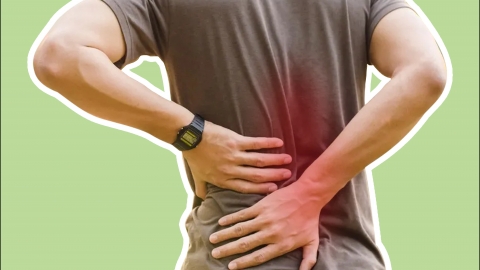What could cause sudden lower back pain in a 70-year-old elderly person?
Generally, sudden lower back pain in a 70-year-old elderly person may be caused by improper posture leading to strain, muscle spasms due to cold exposure, lumbar osteophyte formation (bone spurs), lumbar disc herniation, or lumbar compression fractures. It is recommended to seek medical attention promptly, identify the underlying cause, and receive symptomatic treatment under a doctor's guidance. Specific causes are analyzed as follows:

1. Strain from improper posture: When an elderly person rises, bends over, or turns too quickly, uneven force on the muscles or ligaments in the lower back can cause a strain and result in pain. Immediately have the person lie down and rest, avoiding any movement of the waist. Apply a cold compress with a towel within the first 48 hours to reduce swelling; after 48 hours, switch to a warm compress to improve local blood circulation.
2. Muscle spasm due to cold exposure: Insufficient warmth around the lower back exposes the area to cold, causing the muscles to contract and spasm, resulting in sudden pain. Promptly add warm clothing to protect the lower back and use a hot water bottle for heat therapy, applying it for 15–20 minutes at a time to relieve muscle spasms and reduce discomfort.
3. Lumbar osteophyte formation: Age-related degenerative changes in the lumbar spine lead to bone spur formation along the vertebral edges, which may compress surrounding tissues and suddenly trigger lower back pain during movement. Patients may take medications such as ibuprofen sustained-release capsules, glucosamine hydrochloride capsules, or chondroitin sulfate tablets as directed by a physician to alleviate pain and support joint health.
4. Lumbar disc herniation: Degeneration of the intervertebral discs in the elderly can cause the annulus fibrosus to rupture and the nucleus pulposus to protrude, compressing nerve roots and causing sudden lower back pain, possibly accompanied by numbness in the lower limbs. Patients should follow medical advice to take medications such as mecobalamin tablets, vitamin B1 tablets, or celecoxib capsules to nourish nerves and reduce inflammation.
5. Lumbar compression fracture: Reduced bone density in the elderly means even minor forces—such as coughing or bending over—can cause vertebral compression fracture, leading to sudden, severe back pain. The patient should remain on bed rest; in severe cases, percutaneous vertebroplasty may be required, where bone cement is injected to restore vertebral height and relieve pain.
Daily care should focus on protecting the elderly person’s lower back by avoiding heavy lifting, rapid bending, or twisting motions. Choose a mattress with moderate firmness to maintain the natural curvature of the lumbar spine. Regularly schedule bone density screenings and ensure adequate calcium intake to prevent spinal issues related to osteoporosis.









